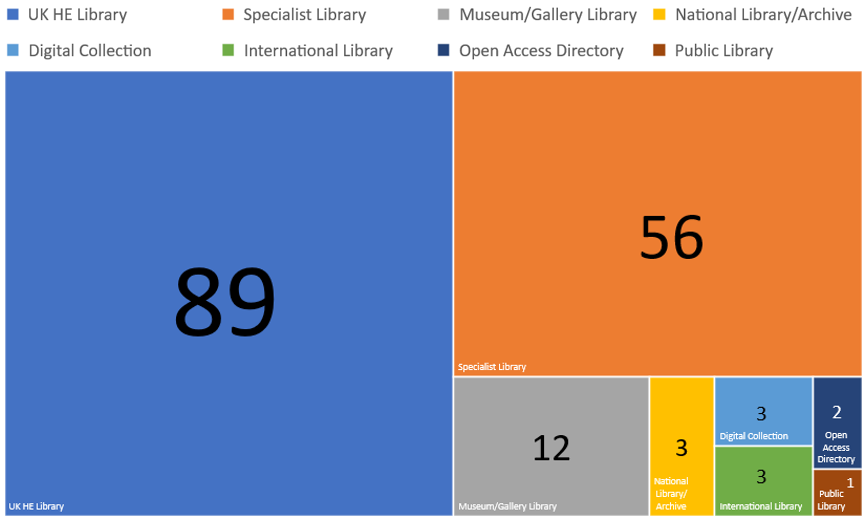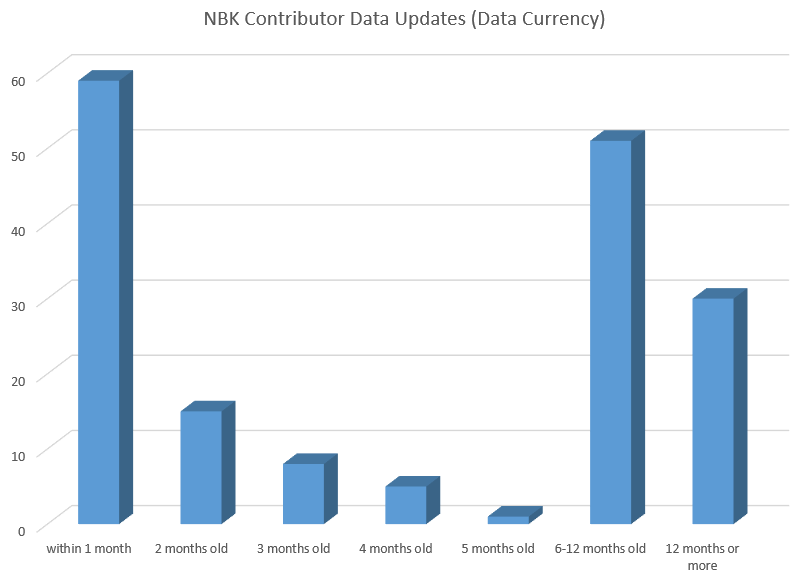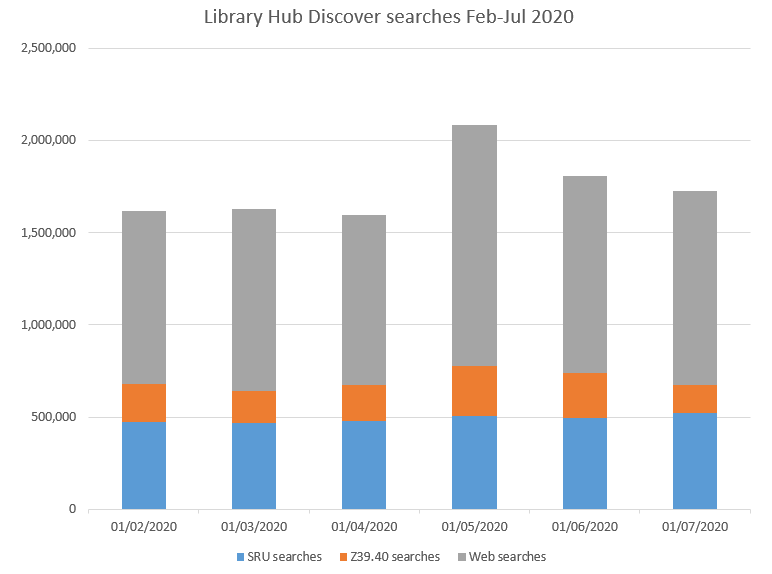We thought it might be useful to give a general update about the NBK and Library Hub services. We’ve talked on this blog about events and webinars and new contributing libraries – but we haven’t reflected recently on where we’ve got to and where we’re headed.
In case anyone reading this post is not too familiar with the NBK/Library Hub, let’s get everyone on the same page.
The National Bibliographic Knowledgebase (NBK) is a very large Jisc-hosted aggregation of bibliographic metadata that is mostly contributed by academic and specialist libraries across the UK. The NBK provides a data foundation for a number of Jisc services that form a suite of products known as ‘Library Hub’. The Library Hub services that are currently available were launched in August 2019 after 2.5 years of development.
Are we getting good participation from libraries?
As of the start of November 2020, the NBK holds a total of 46,087,264 consolidated (matched and deduplicated) bibliographic records created from 123,277,192 original records contributed by 169 libraries. The breakdown of the types of institutions contributing data is set out below.

One of the principle objectives of the NBK from the outset was to build the most comprehensive view possible of UK academic and specialist library holdings. Looking at the list of contributing libraries, we’ve made good progress towards that goal. Nonetheless, we are continuing to reach out and are particularly interested in working with HE libraries whose data we have not yet managed to ingest. If you would like to get your data into the NBK, drop us a line at nbk@jisc.ac.uk.
Is the NBK data recent and reliable?
As well as working at scale, another critical factor that we are looking to address is data currency. The ambitious aim is to elicit weekly updates from contributing libraries where they have the capacity and capability to support that workflow. At the time of writing, the data currency picture looks as follows, with the Y axis corresponding to numbers of libraries.

So whilst one-third of library data in the system is current to within 1 month, there is considerable scope for the NBK to work with the community to streamline and accelerate workflows (especially once the current Covid crisis has abated and libraries have more time). As part of this we would like to explore the feasibility of setting up ‘pull’ mechanisms for data rather than relying on the current ‘push’ model that requires libraries to frequently schedule exports of the changes made to their catalogue.
Use of Library Hub Services
Library Hub Discover is a globally available and open service that attracts use at the rate of about 100,000 sessions per month on average (a session will usually involve multiple searches). During the recent period of Covid19 disruption which has interrupted study and research, use of Discover has declined by a fairly uniform 30%. But even so, looking at the total number of searches conducted during the period February – July 2020, the service is heavily used. (Over 2 million searches per month in May).

The use cases for the other two current Library Hub services are quite different and show a much more targeted pattern of use.
Library Hub Compare (login required) offers important functionality to a quite specific community of practitioners responsible for collection management. Over 120 different institutions have searched Compare since its launch in July 2019 performing over 15,000 searches.
Library Hub Cataloguing (login required) enables libraries to find and download MARC records for inclusion into their local catalogues and is seeing usage climbing towards 20,000 searches per month.
What’s on the Horizon?
One of the key things we are working on at the moment is a change of direction and a re-launch of the Cataloguing service. We have been working in partnership with OCLC since 2017 to build and deliver that service but as of February 2021, we will be re-launching it as a Jisc-hosted service and aligning it more closely with Discover and Compare.
Jisc and OCLC remain in close discussion around future collaborative activities (particularly on the question of data synchronisation with WorldCat). We will be working together to explore opportunities in relation to Plan M. We have been working with consultants to define next steps in that area and will be looking to convene further community discussion towards the end of November.
Looking towards April/May next year, we plan to launch a service called Library Hub Contribute. It will be an upgrade and a formalisation of an existing quite basic interface that contributors can use to check the progress of data loading. The enhanced interface will provide configuration options for contributors and will help to streamline and more effectively document the process of getting data into the NBK. We will also explore whether we can provide usage data and feedback to institutions (on data issues) through this service in future.
In July 2021, we are planning to launch a pilot service called Library Hub Analyse. It will provide powerful dashboard functionality that will enable cataloguing and collection management staff in libraries to drill down into their own data to identify problems or gaps. Users will be able to quickly and easily isolate areas of their catalogue that are problematic, and then either work with other data in the NBK; or work with data suppliers to rectify the issues. Analyse will be a subscription service and will not be part of the core service offering.
NBK Long-Term Roadmap
Working with RLUK, SCONUL and relevant governance groups, we are shaping and defining a 5 year roadmap for the NBK and Library Hub services. We have built and are now looking to make the most of a key piece of national library data infrastructure. The data in the NBK provides opportunities to underpin activity in a number of areas, including:
- Helping to streamline the metadata market place (Plan M)
- The coordination and shared management of print monographs
- Providing a more direct dissemination channel for publisher-created metadata
- Joining up library and learner analytics
- Enabling the creation of a comprehensive linked bibliographic data meta-content layer
We look forward to working with Jisc members and the wider library community to ensure that we are making optimal use of this important national resource.

